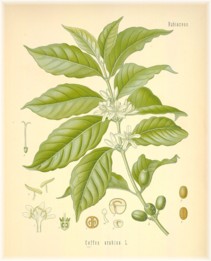Coffee Cravings
By Audrey Stallsmith

Coffee is a social binder, a warmer of tongues, a soberer of minds, a stimulant of wit, a foiler of sleep if you want it so. From roadside mugs to the classic demitasse, it is the perfect democrat.
--Anonymous
A recent National Geographic article by T. R. Reid described caffeine as "the world's most popular psychoactive drug." And most users get their daily fix from the traditional source.
According to Reid, caffeine actually means "something found in coffee," after all, though the drug appears in at least 60-some other plants as well. And in The Healing Herbs, Michael Castleman reports of coffee that "the average American drinks 28 gallons a year."
According to legend, a lowly goatherd named Kladi noticed that his charges were more apt to kick up their heels when they feasted on certain bushes which sported shiny leaves and small round red fruits. After chewing on those berries, he felt perkier himself and, believing this to be a miracle, hied himself to the nearest monastery to report it.
There, the Abbot, fearing that the fruits had a more sinister origin, flung them into the flames--to send them back, so to speak! Taking the pleasant aroma that resulted as a sign from God, he ordered his monks to rake the beans out. The monks dropped them in water to cool, and the rest is history!
Those berry-bearing plants were probably Coffea arabica, which thrives at high elevations and produces seventy percent of the beans sold throughout the world. Its glossy leaves are also high in caffeine, so you could presumably brew a coffee tea! Each of coffea's red berries contains two green seeds which, when roasted, morph into the brown beans we known as coffee.
That name was derived from Caffa, a province in Ethiopia, from which the plant was introduced into Arabia in the 1400's. For two centuries, the Arabs held a monopoly, shipping the beans from a port called Mocha, until the Dutch started growing coffee on the island of Java. By 1630 the "hellish black brew" had reached England. Although the Brits preferred their tea, the American Continental Congress--rebelling against the 1773 tea tax--declared coffee the official American beverage.
It has not yet been declared officially good for you, though, as tea and cocoa have. But it used to come in handy for the reviving of those afflicted with drunkenness or a narcotic-induced coma. Besides acting as a stimulant, caffeine can also relieve asthma attacks and migraines, and may even help prevent weight gain and Parkinson's Disease.
But it should be consumed in moderation. I have seen a college student's hands shake uncontrollably after she'd been swilling java during an all-night study session.
Persons with ulcers or heart problems should probably limit their consumption of coffee, since it boosts stomach acid, temporarily raises the blood pressure, and increases the risk of a heart attack. It also, reportedly, decreases a woman's chances of getting pregnant.
Reid's article reports that "people who consume caffeine have higher rates of kidney and bladder cancer, fibrocystic breast disease, pancreatic cancer, and osteoporosis." Jethro Kloss of Back to Eden fame claimed coffee "weakens the heart muscle. . .hinders digestion, is a cause of constipation, and poisons the body."
I am one of those peculiar people who never learned to drink coffee, which is probably just as well, since I tend to be sensitive to stimulants. So I get my weaker dose of caffeine from the "other bean" (chocolate) and tea.
As for those of you addicted to your java, most of the experts recommend that you consume no more than two cups a day. Maybe you can replace your afternoon coffee break with a proper British tea. It delivers a milder kick of caffeine plus some very nice antioxidants. If, like me, you find regular tea a bit bland, you can always throw in a few--also healthy--spices to make chai.
As with any herb, moderation seems to be the key word here. Too much of anything, we are always adjured, can be bad for you. So it's always a good idea to vary your diet as much as possible. Not only is that healthier, it's loads more fun!
Coffea arabica image is from Kohler's Medicinal Pflanzen, courtesy of the Missouri Botanical Garden Library.








